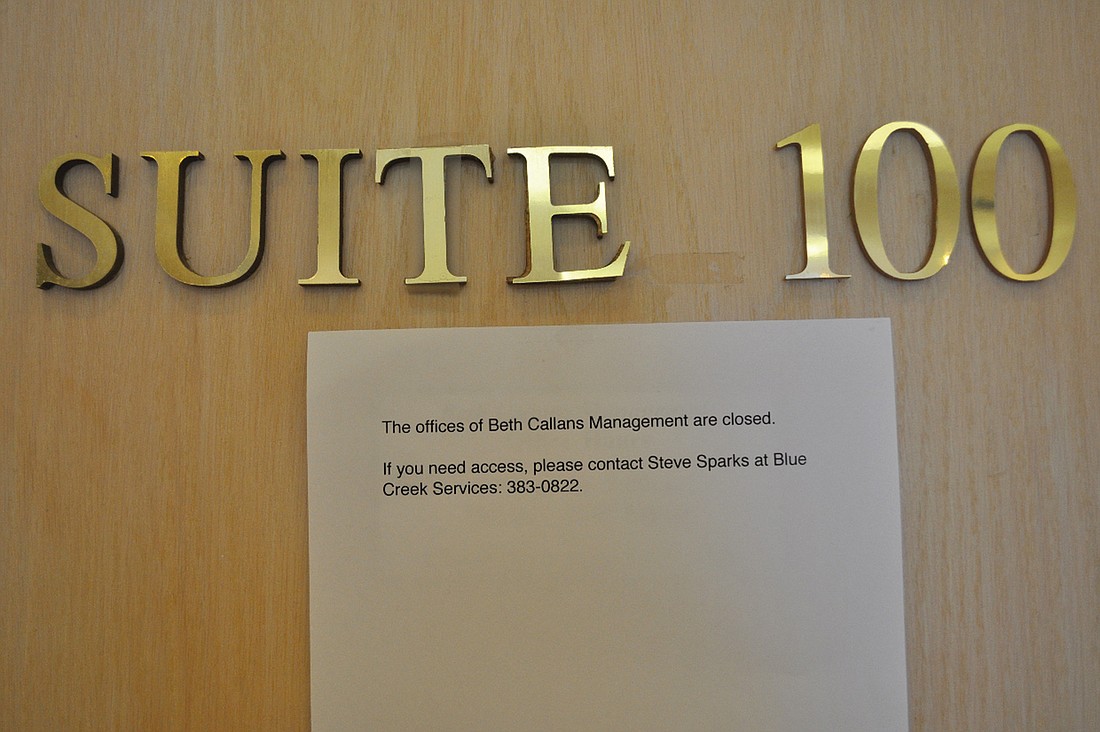- April 19, 2024
-
-
Loading

Loading

Beth Callans Management closed its doors last week, and now its landlord is seeking damages claiming the property-management company owes a total $93,558.72 in rent for the past four months.
On Tuesday afternoon, a sheet posted on the door of Beth Callans Management’s headquarters stated:
“The offices of Beth Callans Management are closed.”
The Longboat Observer called the number listed on the company’s website, bethcallansmgmt.com, and was told by a woman who answered that it had dialed the wrong number. When asked, the woman confirmed that the call had been forwarded to an answering service and said that the number was the former phone number of Callans’ office.
The company’s closing marked a dramatic turnaround for the firm, which Callans founded with a single employee in 1998. By 2009, the firm had nearly 200 employees and revenues that topped $8.4 million.
But former employees said internal issues began to surface over the past year or two. Seven weeks ago, the company was late with payroll checks. The company was late with checks a second time, and last week, was unable to make payroll. Around the same time, many of the nearly 80 properties that the company managed — approximately half of which are located on Longboat Key — began terminating their contracts with the company.
According to one Longboat Key condominium manager who worked for Callans and spoke to the Longboat Observer on the condition of anonymity, some office staff members eventually received checks for the most recent pay period. Some condominium and community associations have agreed to pay onsite employees for their time, even though they were billed by Callans’ company for staffing, while others have not been paid, according to both former employees and community association leaders.
Last week, employees told the Longboat Observer that they were in the process of removing their personal belongings and files for the properties they manage from the office.
The Longboat Key condominium manager said many onsite employees are still working at the same communities.
“Most of the onsite employees have been retained by the associations to stay onsite,” he said.
Sarasota County 12th Judicial Circuit Judge Charles Roberts signed a motion for emergency injunction Aug. 5 filed by Med Plaza Ltd., a Florida limited partnership, ordering Beth Callans Management, Beth Callans individually and their agents to “cease and desist their efforts to remove any and all equipment, furnishings, furniture trade fixtures, inventory and other personal property situated on the premises.”
In the motion, Med Plaza Ltd. claims that the terms of its leases provide it with a lien against property kept within the premises and claims that the “removal or sale by tenant of the property subject to the plaintiff’s lien is unlawful.”
“The tenant is known to be in the process currently and has been witnessed by agents of the plaintiff removing boxes situated on the premises in violation of Florida statutes and the landlord’s lien,” the motion states.
“On information and belief, the tenant intends to close its business today and to remove the entirety of the equipment, furnishings, furniture trade fixtures, inventory, and other personal property situated on the premises and abscond with such goods, with intent to conceal, sell or otherwise dispose of those goods subject to the landlord’s lien,” the motion continues. “Further, Defendant Beth Callans has been in the hospital and not present at the premises. Further, employee payroll has been missed and based on information and belief said unpaid, unsupervised employees may remove furnishings, furniture trade fixtures, inventory and other personal property situated on the premises as reimbursement for payroll.”
The injunction will go into effect with the plaintiff’s payment of a $10,000 bond to protect the interest of the tenants and remain in effect until further order of the court.